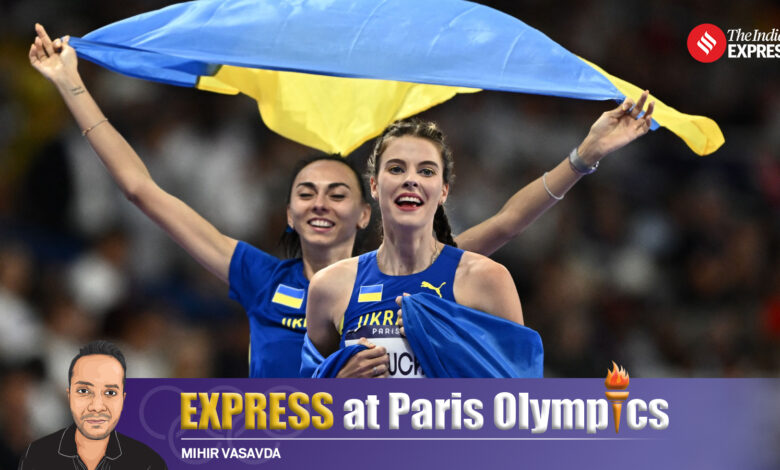Paris Olympics: Away from war, Team Ukraine wins a battle, and more | Sport-others News

Yaroslava Mahuchikh’s trademark yellow-and-blue eyeliner, the colours of the Ukrainian flag she has draped herself in, sparkle under the bright lights of the Stade de France. The high jump gold medall, who broke a 37-year-old world record last month, hugs compatriot Iryna Gerashchenko, the bronze winner.At the other end of the field, Mykhaylo Kohkan, part of Ukraine’s National Guard (its military force), watches his compatriots run a lap of honour. The hammer-thrower hopes he too can join them, his event isn’t over yet. “(I) had prayed to God, ‘Can I please stay in the medals?’,” he would say later. “I thought it would be very nice if I get the medal also, and we could celebrate together on this magical Olympic evening.”
Kohkan’s effort of 79.39 metres gets him the bronze. Gerashchenko — who, like Kohkan, had finished fourth at the Tokyo Olympics — grins. “We did it! We are happy today!”
. Yaroslava Mahuchikh of Ukraine celebrates after winning gold. (Reuters)
Inside this Parisian coliseum, the trio is painting a picture of resilience. It’s Ukraine’s finest hour at the Paris Olympics, winning three medals including a gold. On X, the war-ravaged country’s president Volodymyr Zelenskyy showers praise on the trio: “We are very proud! Thank you for this result… Ukrainians know how to be strong and how to win.”
At the stadium, the Ukrainians exit the ground to let the 100m sprinters take centre stage and walk into a dull, cramped room where reporters from close to two dozen countries surround them. Kohkan has an easy smile and oozes natural charm. But a crease appears on his forehead when asked if he’ll have to join the battlefront now that the Olympics are over. “I don’t know,” he mutters.
Next to him, Geraschchenko breaks down, fearing for her friends and family. “I have many friends who are fighting now, and who died. It is very hard. They are very strong… This medal is for them. I can be here because they are at the frontline,” she says.
In a quavering voice, Mahuchikh calls the moment “incredible”, given the circumstances. “In my country, the Russians killed people and almost 500 sportsmen died in this war… they will never compete and celebrate and feel this atmosphere.”
On the “biggest night” of her life, Mahuchikh’s mind constantly goes back to the well-being of her family in Dnipro, her hometown. Home to military hospitals and rocket factories, Ukraine’s industrial hub has been a regular target since the beginning of Russia’s invasion in February 2022.
Gold medall Yaroslava Mahuchikh of Ukraine celebrates on the podium with her medal. (Reuters)
“Unfortunately, even at an Olympic Games, the war goes on,” Mahuchikh says. “We’ve had a lot of alarms and explosions in my region. It’s really tough for us, but we’re fighting on every field. We do our best.”
To put it mildly, doing their best hasn’t been easy.
Among the countries that were once a part of the Soviet bloc, Ukraine has been the best performer at the Olympics after Russia. When they left their homes, paused their lives and started afresh at new bases in new countries, these athletes wondered if Ukraine’s sporting fortunes would dip.
It hasn’t, at least given the situation. As of Monday afternoon, Ukraine, represented here 142 athletes, has six medals, including two gold — the second won in fencing. Every medal and every medall, though, has a story to tell.
Iryna Gerashchenko of Ukraine celebrates with her national flag after winning bronze. (Reuters)
Since the war began, hundreds of sports facilities across Ukraine have been destroyed. In Mariupol, the port city that’s now occupied Russia, an aquatic centre was bombed, forcing diver Stanislav Oliferchyk to alter his training plans.
In 2023, Valentyn Vozniuk, a track and field coach who nurtured past and future generations including hurdler Anna Rhyzykova — the London Olympics bronze medall — was among 46 people killed a missile that hit an apartment building in Dnipro.
Mahuchikh woke up one February morning in 2022 to a loud bang which signalled that her hometown had become a target of Russian aggression. The explosion was caught on camera and “created panic”. The jumper tried to ignore the warning sirens and the blasts around her, but she decided to flee her home. Initially, she moved to a near village to live with her coach, where they would “rush to a basement when the sirens would go off”. Eventually, on March 6, 2022, Mahuchikh had to leave her country. A three-day, 2,000 km road trip took her to Belgrade where she continues to live.
Her teammate Gerashchenko escaped from Kyiv with her “husband and dog”, leaving everything else behind, including her spikes. “Our families (are) in Ukraine, we have friends who are fighting for our country. I cannot forget about this,” Mahuchikh says.
Kohkan tries to explain why he is playing sports while his friends and colleagues in the Army are fighting a war. It’s a question he’s been wrestling with internally, the hammer thrower admits. He found motivation to fight through sport, which, he says, is also for a “national cause”.
“I am more useful here than there,” he says. “I started my career as an athlete so I know how to do it. I can do this (practice) because I am preparing for the Olympics, to lift our flag and remind people that we still have war (going on) and we have to do something.”
It’s why Mahuchikh also wears the yellow-and-blue eyeliner. For her, it isn’t a style statement. It’s a simple act of defiance.



